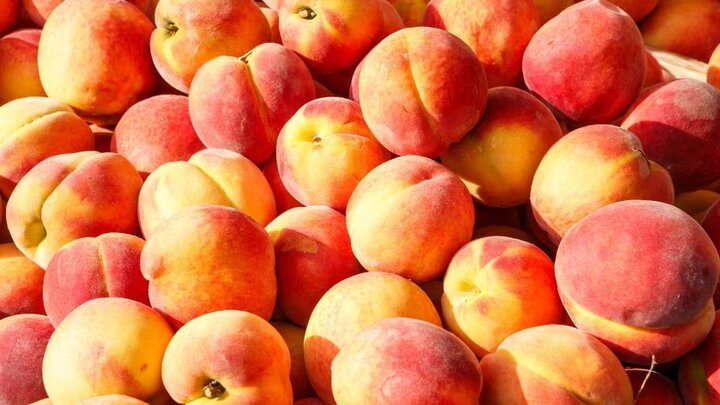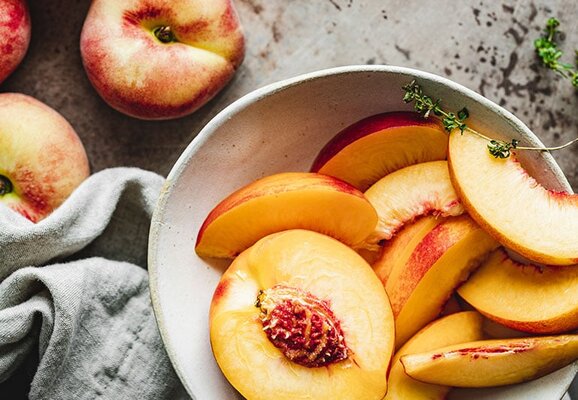Peach Nutrition: Understanding the Facts About Calories, Protein, Fat, Carbs, and Vitamins
Peaches are a delicious and nutritious fruit that offer a range of benefits for overall health. Understanding the facts about peach nutrition can help you make informed decisions about how to incorporate them into your diet.
Calories in Peaches

One medium-sized peach contains about 60 calories, making it a low-calorie snack or addition to a meal. Compared to other fruits, peaches are relatively low in calories, with slightly more calories than strawberries but fewer calories than bananas or apples.
Peaches can be a healthy addition to a balanced diet, as they provide important vitamins and minerals while also offering a sweet and satisfying flavor. Consider adding sliced peaches to a bowl of oatmeal, blending them into a smoothie, or topping a salad with fresh peach slices.
Protein in Peaches
While peaches are not a significant source of protein, they do provide a small amount. One medium-sized peach contains about 1 gram of protein. While this may not seem like much, every little bit counts when it comes to meeting your daily protein needs.
Protein is an essential macronutrient that plays a key role in building and repairing tissues in the body. While peaches are not a primary source of protein, they can still contribute to a healthy and balanced diet.
Fat in Peaches
Peaches are virtually fat-free, with less than half a gram of fat per medium-sized fruit. While the body needs some dietary fat for proper functioning, it is important to limit intake of saturated and trans fats, which can increase the risk of heart disease and other health problems. Peaches can be a great addition to a diet low in these harmful fats, providing flavor and nutrition without added fat.
Carbs in Peaches
Carbohydrates are an important macronutrient that the body needs for energy and proper function. One medium-sized peach contains about 15 grams of carbohydrates, mostly in the form of natural sugars. While some people may try to limit their intake of carbohydrates, it is important to choose healthy sources of carbs that also provide vitamins, minerals, and fiber.
Peaches are a great source of healthy carbs, as they are relatively low in calories and high in nutrients. They can be a great addition to a healthy diet, whether eaten on their own as a snack or added to meals and recipes.
Vitamins and Minerals in Peaches

Peaches are a great source of vitamins and minerals that are important for overall health. One medium-sized peach contains about 10% of the daily recommended intake of vitamin C, as well as smaller amounts of vitamins A, E, and K. Peaches also contain potassium, a mineral that plays a role in maintaining healthy blood pressure and heart function.
By including peaches in your diet, you can increase your intake of these important nutrients while also enjoying a delicious and satisfying fruit.
Health Benefits of Peaches
In addition to their nutritional value, peaches may offer a range of health benefits. Peaches contain several compounds with anti-inflammatory and antioxidant properties, including polyphenols and carotenoids.
These compounds may help reduce the risk of chronic diseases, such as heart disease and certain types of cancer. Additionally, the fibre content in peaches can help support healthy digestion and promote feelings of fullness, which may aid in weight management.
How To Incorporate Fresh Peaches In Your Diet
There are many ways to enjoy peaches as part of a healthy diet. Try slicing fresh peaches and adding them to a salad, blending them into a smoothie, or grilling them for a sweet and savoury side dish.
Peaches can also be used in baking, such as in peach cobbler or peach muffins. When choosing peaches, look for ones that are slightly soft to the touch and have a sweet aroma.
Risks and Considerations
While peaches are generally safe to consume, there are some possible risks and considerations to keep in mind. Peaches may be sprayed with pesticides and other chemicals, so it's important to choose organic varieties when possible.
Additionally, some people may be allergic to peaches or experience digestive discomfort when consuming them. If you experience any adverse symptoms after consuming peaches, such as itching, swelling, or stomach pain, stop eating them and consult with a healthcare provider.
Are Peaches Healthy
Peaches are a delicious and nutritious fruit that can be easily incorporated into a healthy diet. They are low in calories, fat-free, and contain important vitamins and minerals that contribute to overall health.
Peaches are also a good source of carbs and provide a small amount of protein, making them a well-rounded addition to meals and snacks. They offer anti-inflammatory and antioxidant benefits, and may even help reduce the risk of chronic diseases.
Incorporating peaches into your diet is easy and versatile. Consider adding them to smoothies, salads, or oatmeal, or enjoy them as a simple snack on their own.
By understanding the facts about peach nutrition, you can make informed decisions about how to include them in your diet and reap the many benefits they have to offer.